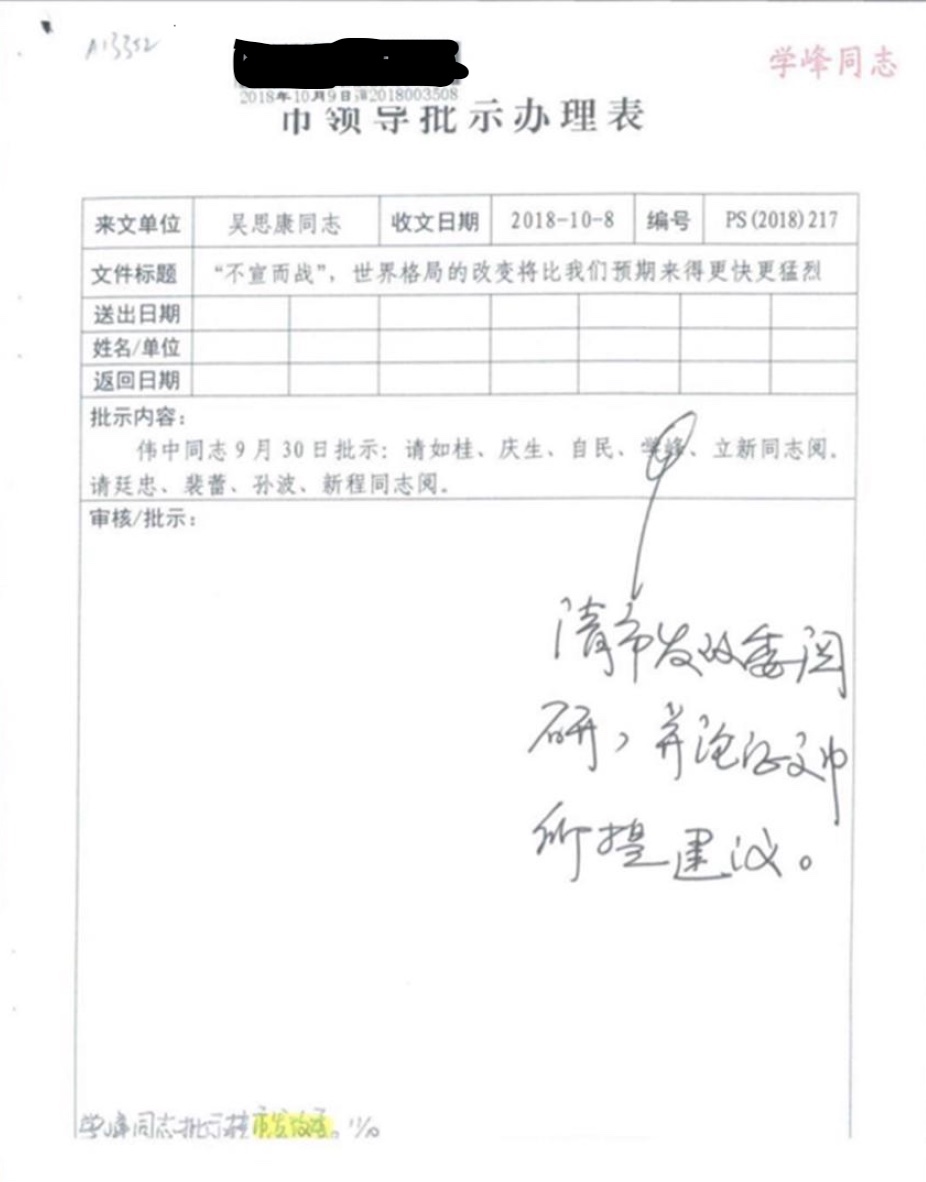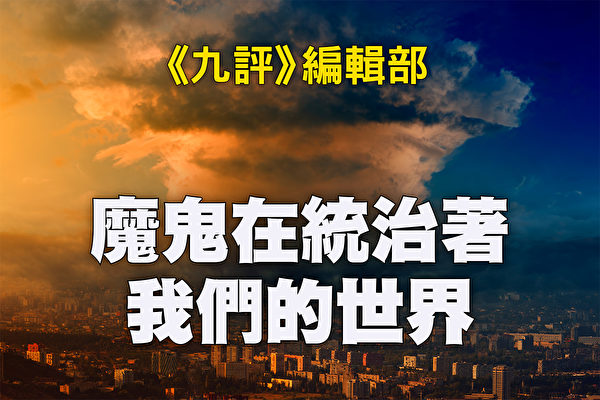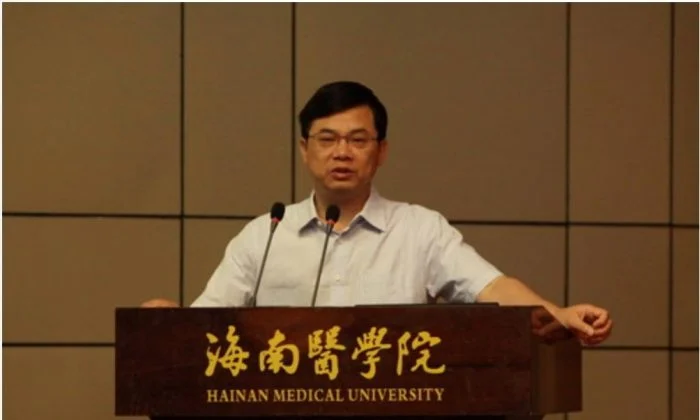Leaked Document Advises Chinese Regime on Fighting New Cold War
Chinese regime urged to take technology quickly before US acts
October 16, 2018 Updated: October 16, 2018
A leaked internal Chinese government document shows that “unrestricted” and “supernormal” means should be adopted to counter the United States, including using “more precise, better concealed, and special ways” to expedite the process of acquiring overseas talent, cutting-edge equipment and technology in the very short “window” that still exists before the United States completely blocks China from importing key technology.
The 12-page proposal, entitled “An Undeclared War: The Change of the Landscape of the World Will be Faster and More Dramatic Than We Have Expected,” consists of two parts. The first part gives a detailed overview of the undeclared “New Cold War” between the United States and China, while the second part lists six recommendations of what China should do to get an upper hand in the fight.
This 12-page proposal was drafted by Wu Sikang, the director of the Development and Research Center of Shenzhen City on Sept. 29. The copy obtained by The Epoch Times was personally signed by Wu and presented to Wang Weizhong, the Communist Party Secretary of Shenzhen City, the most important political figure in a major industrial city of over 12 million people in southern China.
After reading it, Wang asked on Sept. 30 that this file be sent to Mayor Chen Rugui, First Deputy Mayor Liu Qingsheng, Deputy Mayor Ai Xuefeng, and several other chief party and government leaders. On Oct. 11 Ai Xuefeng then ordered members of the Development and Reform Commission of Shenzhen City to read, study, and evaluate recommendations in the file, as shown in the “Form of Carrying Out Written Instructions of City Leaders” obtained by The Epoch Times.
Recruiting Talent
The first recommendation, according to this file, is “to do well with introducing talent in the context of a ‘New Cold War.’”
The proposal says, “We should adopt more precise, better-concealed and special ways to introduce a good number of strategically important science and technology talent, especially non-Chinese top-notch talent, at an expedited speed. We need to utilize the short gap period when the U. S.-led West has not started its war for talent against us on an all-round scale.”
A screen shot of the “Form of Carrying Out Written Instructions of City Leaders”, with instructions of deputy mayor Ai Xuefeng, asking this file to be sent to members of the Development and Reform Commission of Shenzhen City for them to read, study and evaluate the recommendations in the file.
This recommendation goes on to say that China needs to do research and make judgments in advance to predict what kind of talent they will most need, and then try to look for talent who come from third world countries, but complete their education in developed countries. These talents should be given better salaries and rewards than the standard international level. A good environment and services should be provided to attract them and make them willing to settle down in China and carry out their careers there.
The file also mentions that China should learn the lesson from the “Thousand Talents Plan,” which drew the attention of the FBI and became its target. Therefore, when introducing new talent, much higher payments should be offered, but everything should be kept low key in order to avoid attention from the outside world.
Time Is Short
The second recommendation is to seize the “‘Window period’ opportunity before the United States starts blocking China comprehensively, adopting unconventional means to import all sorts of cutting-edge science research equipment and instruments, and doing material preparation well in the context of a ‘New Cold War.’”
The proposal says that the gap between China and the United States mainly manifests in science research equipment and instruments. While the United States might mobilize its allies to enlarge the scale of high-tech product export restrictions against China, there might be a half to one year “window period” before actual actions can be taken.
“We need to, at all costs, make every possible effort, through all sorts of channels, to import all sorts of cutting-edge science research equipment and instruments. We need to transfer our investment and reserve from the real estate sphere to the cutting-edge science research equipment and instruments sphere.”
The third recommendation is to “establish, as fast as we can, high-level science and technology think tanks to follow, analyze, study and make judgments about the development trend of advanced international science and technology.”
According to this recommendation, China needs to bring together the most outstanding strategically important science and technology talent from all over the world and to establish information and data centers, while taking advantage of the fact that it is very convenient to access international science and technology data from Hong Kong.
Using International Cooperation
The fourth recommendation is to “proactively counter the United States’ blockade in science and technology and to proactively initiate international science and technology events.”
China should “turn the international cooperation on basic research into an important vehicle for us to break through the technological blockade. Adopt all kinds of flexible ways to strengthen our scientific and technological cooperation with superpower countries in science and technology; support the endeavors of Chinese people and Chinese enterprises to establish universities and research institutions in overseas countries.”
A screen shot of the leaked internal file personally signed by Wu Sikang, the director of Development and Research Center of Shenzhen City , and addressed to Wang Weizhong, the Communist Party Secretary of Shenzhen City, with Wang Weizhong's comments and instruction asking other city leaders to read this file.
No Legal Restrictions
The fifth recommendation is to “seize the opportunities brought about by the differences between the legal and institutional systems of China and the United States and to expedite the development of new types of industry and businesses.”
The proposal gives the example of Facebook’s market value dropping by $50 billion dollars, and that it could face a fine as high as $2 trillion, as a consequence of 50 million users personal information having been leaked.
According to this proposal, China does not have to worry about encountering the same situation as Facebook. China has over 1 billion internet users, who don’t have much sense of privacy protection.
“This, to look at it dialectically, is also our opportunity to develop an internet-based economy. We need to seize this time window to expedite the development of new economic and business models to get an upper hand in global, internet-related business competition.”
“In the meantime, the development of new technology in areas such as biomedical is closely related to regulations and rules. We can designate special zones as experimental areas, and adopt special policies in these areas to support, serve and regulate these industries to expedite the development of new technology and new types of businesses.”
Establishing New Entities
The sixth recommendation is “to create a highland for industrializing global scientific and technological achievements, and to provide comprehensive, undifferentiated support for non-Chinese international talent in terms of providing funding, talents, and preferential policies” and to establish specialty bodies to provide service for foreign talents to enable them to establish their own entities.
“Provide targeted services from financial support to accommodating industrial facilities and applications. Strengthen cooperation with globally renowned technology transfer institutes, build up and introduce a number of international and professional technology transfer service organizations, and construct a global network of technological achievement transfer.”
Important Messages
The Development and Research Center of Shenzhen City that produced this proposal is part of a nationwide system of governmental policy research and consultant bodies. The highest-level center, the Development and Research Center of the State Council, was set up during former Chinese premier Zhao Xiyang’s time, in the 1980’s.
Economic analyst Qin Peng said, although the leaked file was only from a city-level development and research center, its messages were nonetheless important for the outside world to learn.
Qin noted that Wu Sikang, author of the proposal, was a special invitee at a special economic symposium hosted by Chinese Communist Party (CCP) leader Xi Jinping in 2016. Wu is obviously a very active expert.
Qin said although the Chinese Communist regime’s stance in the leaked file did not differ from its long-standing policy of stealing and gaining by all means possible, he was particularly struck by the fifth recommendation, which shows the Communist regime is ready to take advantage of the loopholes in China’s legal and social system to profit from internet users’ personal information.
According to Qin, the mentioning of the differences between the legal and institutional systems of the United States and China in connection with biomedical products could mean that the Communist regime is ready to use the Chinese people to do medical tests that are not allowed by U. S. laws and regulations.
Qin said that Shenzhen has been a model zone for China’s openness and reform, as well as high-tech product manufacturing, and plays an important role in “Made in China 2025,” the ambitious plan for China to gain dominance over the cutting edge technologies of our time.
In his 2018 annual government report, Mayor Chen Rugui vowed to build Shenzhen into a “model zone for ‘Made in China 2025’”.
According to “Action Plan of ‘Made in China 2025’ in Shenzhen” released in 2016, Shenzhen will become the front runner and a strong international manufacturing city in intelligent manufacturing, green industry, and high-end manufacturing by 2025.
Source: https://www.theepochtimes.com/leaked-document-advises-chinese-regime-on-fighting-new-cold-war_2691712.html







